SCERT AP Board 10th Class Social Solutions 21st Lesson Social Movements in Our Times Textbook Questions and Answers.
AP State Syllabus SSC 10th Class Social Studies Solutions 21st Lesson Social Movements in Our Times
10th Class Social Studies 21st Lesson Social Movements in Our Times Textbook Questions and Answers
![]()
Question 1.
Here are the list of items that you can use for making a table on social movements. Draw a table based on them and find out similarities and differences amongst movements:
Main area of focus of the movement; location, main demands, modes of protest, important leaders; response from the state; possible impact on society.
Answer:
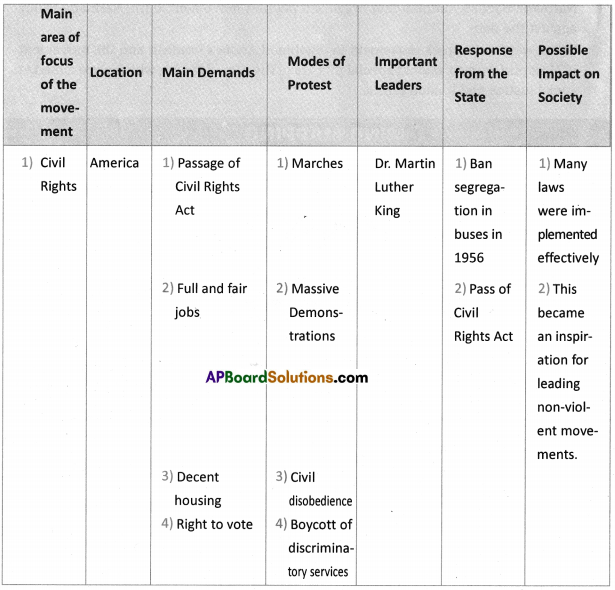
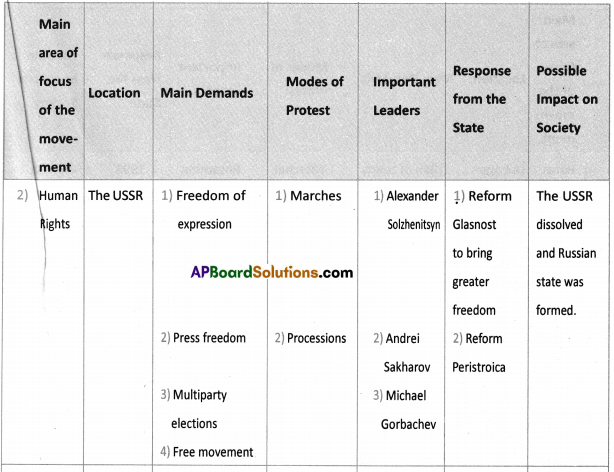
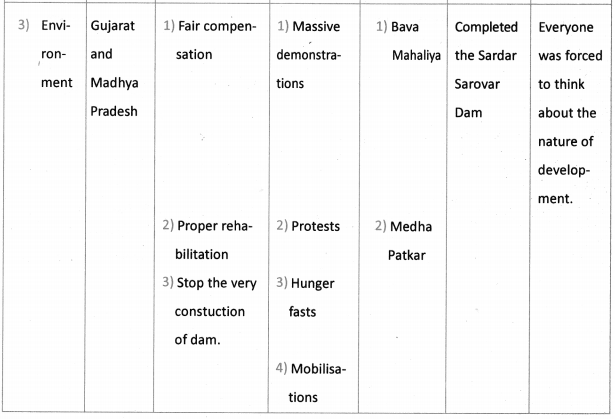
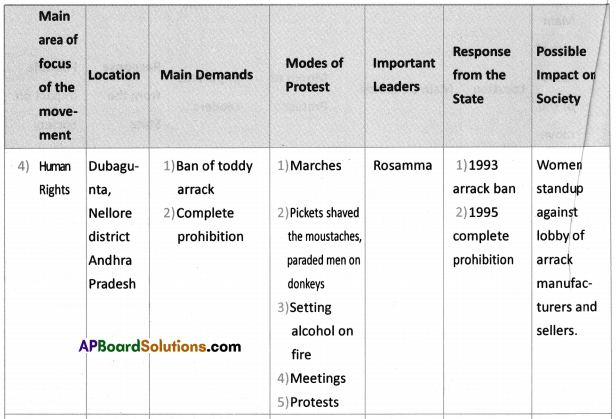
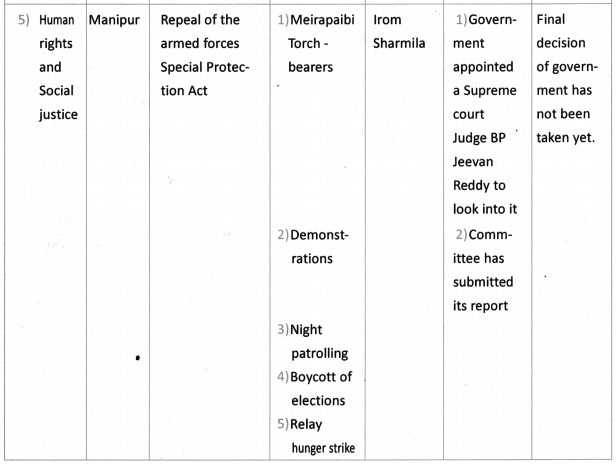
Question 2.
Kanayya, Ramya and Salma have a debate. They have different expectations. Whom would you agree with and give reasons, from the context of human rights? Ramya argues it is okay to restrict the freedom of the press, etc. but ensure people do not live in poverty. Salma argues it is food alone is not important but equally important to have freedom of press because there is no other way people would know if there is violation of dignity of people in different parts of the country. Kanayya says, how will it make a difference if press belongs to the rich and powerful people, why would they cover things that ordinary people expect.
Answer:
- I agree with Ramya.
- She argues that food alone is not important but also to have freedom of press.
- If we do not have freedom of press, there is no other way people would know if there is violation of dignity of people in different parts of the country.
- Now with globalization, world has become a tiny village.
- People are coming to know and responding quickly in social media.
- Everyone has the right to life, liberty and security of person.
- No one shall be subjected to inhuman or degrading treatment.
- Protection of most human rights is important.
![]()
Question 3.
What are the basic features of social movements?
Answer:
The basic features of social movements :
- They are based on values of justice, democracy and civil rights.
- Protection of the cultural sphere.
- The prevention of a change in societies structure and values.
- Protection of livelihood and health.
- Equal treatment in the society.
- Protection from the consumption of alcohol and drugs.
- Protection of the environment.
- Protection of agricultural lands.
Question 4.
How is the role of the ordinary individuals described in the above case studies ?
Answer:
- Without the participation of ordinary individuals any social movement cannot be a successful one.
- They were the ones, who suffered and dejected.
- They make their voices heard through their leaders.
- They actively participate in marches, boycotts, processions planned by their leaders.
- Nowadays they are making use of internet and social media to mobilise and fight for their cause.
- They not only think of personal profits, hope for better future and sustainable environment.
- They even oppose their own government and support the human rights of the sufferers.
- Most movements involved them are peaceful in nature.
Question 5.
How are the rights of black people in the USA and Meira Paibi movements similar or different?
Answer:
- The rights of black people in the USA are violated by law.
- They are met with inhuman treatment.
- They are discriminated in schools, transport facilities, job, housing and even in voting righ/s.
- But they are given right to freedom of movement.
- In Meira Paibi movements, the most suffered are women.
- Their right to life, liberty and security of person are taken away by special protection law.
- They are subjected to cruel and degrading treatment.
- Their men and children are detained on no fair cause.
- They are not even given the right to freedom of movement.
- Government has yet to take a decision on Meira Paibi’s demands.
![]()
Question 6.
Democracies have been identified as most prominent political systems across the world.
Do you think it has been able to take care of all expectations of people. Based on the examples cited in these chapters, write a short note on ‘democracy and social movements’.
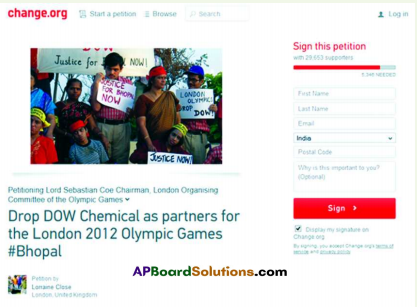 Answer:
Answer:
Democracy and Social Movements :
- Social movements are mostly the outcome of dissatisfactions in the society.
- The ruling democracies are not able to fulfil the expectations of people.
- Some section or the other in the society is suffering with denial of human rights or social justice.
- Their ire is augmented and shapes into a movement.
- When governments are after nuclear arms and not providing peace and security to people usually people resent it and movements come up.
- When people are discriminated, they revolt against administration. Likewise, whenever there is lack of social justice and when there is a threat to environmental system also movements come out.
![]()
Question 7.
Discuss and find out how movements mobilise people from across the globe like in the above instance of campaign to protest in the context of Bhopal gas tragedy.
Answer:
- Movements seek a vision that is different.
- Movements mobilise people from across the globe to protest various issues.
- Black Americans organised themselves against the segregation and discrimination they faced.
- People of Russia fought for human rights there, when free multiparty elections were not allowed, Press freedom was not allowed.
- Massive protests took place against the policies of the govemments, which are war mongering.
- Greenpeace movement in the USA protested the conduct of nuclear tests under water in the USA.
- Many such movements related to environment were taken up and people supported them.
- There are various platforms for them like, Facebook, twitter, e-mails, Internet newspaper, etc.
10th Class Social Studies 21st Lesson Social Movements in Our Times InText Questions and Answers
10th Class Social Textbook Page No. 299
![]()
Question 1.
Try to read the famous speech of Dr King and write an essay on the ideals he set for American society and how he planned to achieve it.
Answer:
Martin Luther king set many ideals for the American society. Some of them are,
а) Justice
b) Liberty
c) Equality
d) Unalienable rights of life
e) Pursuit of happiness
f) freedom
g) Democracy etc.
He plans to achieve the ideals in the following ways:
- Negroes should not relax until their demands are met.
- Shaking the foundations of the government with revolt until the bright day of justice emerges.
- The struggle should be filled with dignity and discipline.
- By avoiding physical violence.
- Trusting some white people who sympathize with the blacks.
- He says that with faith all will be able to work together, pray together, struggle together, to go to jail together, to stand up for freedom together, knowing that there will be freedom one day.
10th Class Social Textbook Page No. 300
![]()
Question 2.
Make a table and list the demands of civil rights movement and possible solutions in your opinion.
Answer:
| Demands of Civil Rights movements | Possible solutions |
| 1. Passage of Civil Rights Act | 1. All forms of segregation has to be repealed. |
| 2. Programme for generation of employment | 2. Government should look for promoting industries. |
| 3. Full and fair employment. | 3. Along with whites, Black Americans are also to be considered for employment. |
| 4. Decent Housing | 4. Government shall help the Blacks with construction of houses. |
| 5. Right to vote | 5. All the adults must be given right to vote. |
Question 3.
The USA claims to be a democracy, yet it kept certain groups of people segregated, till middle of last century. Discuss how the idea of democracy need to be more inclusive in our context.
Answer:
- The USA claims to be a democracy.
- It practised segregation, till the middle of last century.
- Democracies cannot afford to alienate their subjects.
- They cannot judge a person by the colour of the skin.
- They cannot shy away the protection of equal rights to all subjects.
- Democracy in this context needed to be more inclusive.
- All the black people are to be treated on same footing with others.
Question 4.
Why do we hear different voices within a movement? Can you identify differences in them?
Answer:
- People have differences of opinions, hence we hear different voices within a movement.
- In American Civil Rights Movement two voices arose. They were –
a) Many people agreed with Dr King that it was possible to achieve equality for all people through peaceful means.
b) Many others like “Malcom X” thought that Blocks should fight for independence from white rule and for that they have to use all means including armed conflict.
![]()
Question 5.
Can you think of similarity or differences in the nature of political system in the USA and the USSR and how was their response to people’s rights?
Answer:
| Political System in the USA | Political System in the USSR |
| 1. Democratic Government. | 1. Socialist system of Government. |
| 2. Freedom of press / media present. | 2. Freedom of press/media is not present |
| 3. Movement of ordinary people is allowed. | 3. Movement of ordinary people is not allowed. |
| 4. No control over people activities. | 4. Kept close control of people activities. |
| 5. Segregation laws are followed. | 5. No such laws in force. |
| 6. Civil Rights Act was passed and successfully implemented. | 6. Glasnost brought greater freedom for the people. |
10th Class Social Textbook Page No. 301
Question 6.
“We Won’t Go”
America has a law which requires all able bodied citizens to enroll in the army for a short period. During the Vietnam War, thousands of citizens refused to get drafted into the army to fight in Vietnam. Let us read about one such protest refusal. This is a statement that appeared in a newspaper, Harvard Crimson:
“We, the undersigned, as American men of draftage, may be asked by our government to participate in the war in Vietnam. We have examined the history and the nature of this war, and have reached the conclusion that our participation in it would be contrary to the dictates of our consciences. We therefore declare our determination to refuse military service (all citizens are required to do so by law) while the United States is fighting in Vietnam. Our intention in signing this statement is to unite with other draftage men who share our convictions, in order to turn our personal moral rejection of this war into effective political opposition to it.”
Some thought that these people were being un-patriotic while others thought that they were justified in refusing to participate in an unjust war. Discuss the two points of view in the class and write a short note of arguments of both sides and your own viewpoint.
Answer:
- Vietnam conflict was the outcome of the Cold War between the USA and the USSR.
- Citizens refused to get drafted into the army to fight in Vietnam.
- The US war with Vietnam was inhuman, hence the majority of the people opposed it.
- People who hate “Socialistic Society” and “Communism” supported the decision of the US to continue the war with Vietnam.
- In my opinion, I oppose the war with Vietnam as it was against democratic principles and human rights.
10th Class Social Textbook Page No. 303
![]()
Question 7.
What were the different types of responses to the weaponisation?
Answer:
- Nuclear arms race intensified after the end of Vietnam war in 1975.
- More and more countries competed with each other to stock pile nuclear arms.
- Arms producing companies and governments created a war panic among the people.
- They created war like situation.
- People believed that war mongering and arms race made the world more unsafe.
- It also increased the possibility of a disastrous war for all countries.
- Massive protests took place against these policies of governments.
Question 8.
If people from different countries meet each other, there would be less chances of war, than the governments alone deciding the policy with each other. Would you agree with this statement? Give reasons for the answer.,
Answer:
- Usually countries formulate their policies.
- People of countries meet together and avoiding war is distant from reality.
- Most countries in the world are democracies.
- People vest their powers through vote to their representatives who could administer them.
- It may be looking simple but, it definitely may not be feasible.
- So, I cannot agree with this statement.
![]()
Question 9.
Explain how environmental issues can affect people of nations who may have no role in deciding the location of nucelar plants, polluting factories, etc. How do you deal with such situation?
Answer:
- Usually people of the nation are suffering lot, whenever there is a nuclear tragedy.
- They really do not have any role in deciding the nuclear plant’s location or pollution factory.
- That will be decided by their representatives and their secretaries.
- They decide the locations taking into consideration, a lot of things like infrastructure, raw material, technology, etc.
- To deal with these situations the governments should take all the protective measures.
- In case of any adversity, they should respond well in time to support the people.
- They should see that proper care is taken about the affected and fair compensations were distributed among the suffered people.
10th Class Social Textbook Page No. 304
Question 10.
Look up the website of Greenpeace movement (http : //www.greenpeace.org/international) to find out about the issues they have been fighting for and how the methods they have used for fighting. Find out about the debates and controversies about this movement too.
Answer:
Students’ Activity.
10th Class Social Textbook Page No. 307
![]()
Question 11.
Is it impossible to build factories or mines or power plants without throwing out farmers or tribal people? What can be the alternatives? Discuss in your family and school on these issues.
Answer:
- Most of the times it is impossible to build factories, mines or power plants without throwing out the farmers or the tribal people.
- Because they need infrastructural facilities and raw material availability, they are to be set up like this.
- Governments should think of alternatives.
- Protection of the farmers and tribals is also lied with the government.
- They should plan of no damage to these sectors of people or the minimum.
- In case of a compulsion, they must be given compensations like land, lump sums and employment.
- More importantly, government should concentrate on viable alternatives to protect the environment also.
10th Class Social Textbook Page No. 308
Question 12.
What were the various strategies used by the social movement?
Answer:
- Social Movements throughout the world used various strategies.
- Civil Rights Movement in the USA used civil disobedience (Violating discriminatory laws peacefully) and boycott of discriminatory services (like buses which segregate whites and blacks)
- Thousands of scientists and intellectuals from across the world campaigned for abolishing all nuclear weapons.
- Volunteers in the USA setout in a smallship “Green Peace’ in protest to underwater nuclear test of the USA.
- People used international laws to fight against the problems that factory workers and women affected in Bhopal gas disaster.
- Women led movements for social justice and human rights.
- People organised movements in protest to pollution, global warming and environmental degradation.
Question 13.
How do the people in movement see the process of resettlement promises?
Answer:
- People who stood to be displaced from the project, demanded a fair compensation not just to those who own land, but all those who lived there.
- People realised that there was actually no adequate land available to compensate for the loss.
- They alsobelieved that it was really not possible to rehabilitate the displaced people properly.
- People began to realise that the problem was not compensation or rehabilitation but one of faulty notion of development.
- A development which was based on unsustainable use of natural resources, only paved way for setting up industries and commercial farms at the cost of farming and tribal communities.
10th Class Social Textbook Page No. 310
![]()
Question 14.
Find out about more recent such struggles in West Bengal (Nandigram), Odisha (Niyamagiri) and Andhra Pradesh (Polavaram, Sompeta etc). Prepare a poster explaining the main features of the struggle in each of these cases.
Answer:
Nandigram (West Bengal):
- Nandigram is a place on the bank of Haldia and quite far from Kolkata.
- In 2007, March the state government of West Bengal sanctioned the land there to set up Special Economic Zone by Salim Group.
- People of Nandigram resented it and led mass processions and struggle and 14 people died.
Niyamgiri (Odisha):
- Niyamagiri hills in Odisha state are famous for their bauxite reserves. Odisha government gave permission to British mining company Vedanta to mine bauxite from there in July 2013.
- People resented this, especially the tribals and organised many processions and later courts involved in this matter and by January 2014 the mining was disallowed.
Sompeta, Polavaram in combined (Andhra Pradesh):
- Sompeta was a mandal in Srikakulam district of Andhra Pradesh and government at the state permitted Nagarjuna Company Limited to set up a thermal plant there in 2010.
- People supported by many opposition party leaders protested the decision of government and for three years there were long drawn struggles.
- Polavaram project is to be constructed on Godavari river spreading in East, West Godavari’s and Khammam. Government obtained permissions and started it in 2004.
- It has submerging areas and affecting, zones in Chattisgarh and Odisha also. Many conflicts were there to complete it.
![]()
Question 15.
Fill in the para and line in the section below which you think is related to the violation or are in conflict with provisions of Human rights.
Article 3: Everyone has the right to life, liberty and security of person. Para ——– line ——–.
Article 5: No one shall be subjected to torture or to cruel, inhuman or degrading treatment or punishment. Para ——– line ——–.
Article 7: All are equal before the law and are entitled without any discrimination to equal protection of the law. All are entitled to equal protection against any discrimination in violation of this Declaration and against any incitement to such discrimination. Para ——– line ——–.
Article 9: No one shall be subjected to arbitrary arrest, detention or exile. Para ——– line ——–.
Article 10: Everyone is entitled in full equality to a fair and public hearing by an independent and impartial tribunal, in the determination of his [or her]rights and obligations and of any criminal charge against him [or her]. Para ——– line ——–.
Article 12: No one shall be subjected to arbitrary interference with his [or her] privacy,family, home or correspondence, nor to attacks upon his [or her] honour and reputation. Everyone has the right to the protection of the law against such interference or attacks. Para ——– line ——–.
Articl e 13: (1) Everyone has the right to freedom of movement and residence within the borders of each state [state here means country], Para ——– line ——–.
(2) Everyone has the right to leave any country, including his own, and to return to his[or her country. Para ——– line ——–.
Answer:
Violations
Article 3: Everyone has the right to life, liberty and security of person. Para 3 line 13.
Article 5: No one shall be subjected to torture or to cruel, inhuman or degrading treatment or punishment. Para 3 line 6 and 7.
Article 9: No one shall be subjected to arbitrary arrest, detention or exile. Para 3 line 4.
Article 12: No one shall be subjected to arbitrary interference with his [or her] privacy, family, home or correspondence, nor to attacks upon his [or her]honour and reputation. Everyone has the right to the protection of the law against such interference or attacks. Para 3 line 10